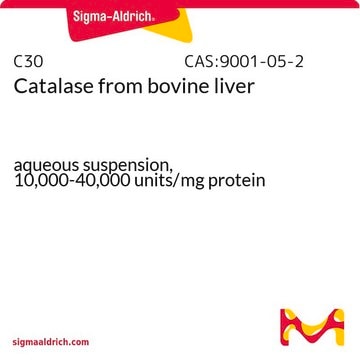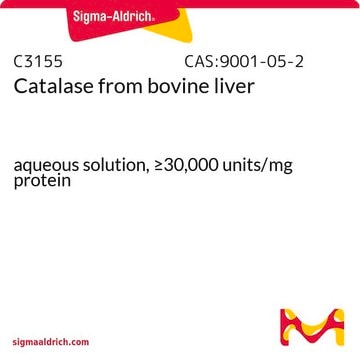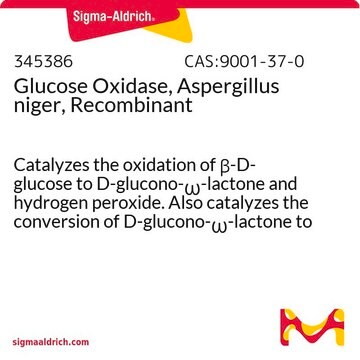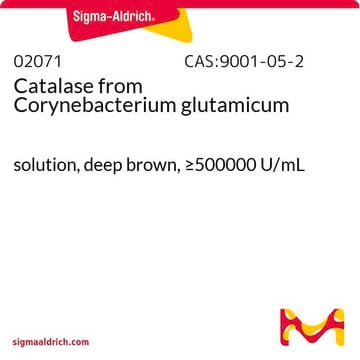C9322
Catalase from bovine liver
lyophilized powder, 2,000-5,000 units/mg protein
Sinónimos:
H2O2:H2O2 oxidoreductase
About This Item
Productos recomendados
biological source
bovine liver
Quality Level
form
lyophilized powder
specific activity
2,000-5,000 units/mg protein
mol wt
tetramer ~250 kDa
isoelectric point
5.4
UniProt accession no.
shipped in
wet ice
storage temp.
−20°C
InChI
1S/C9H10O3/c1-2-12-9(11)7-3-5-8(10)6-4-7/h3-6,10H,2H2,1H3
InChI key
NUVBSKCKDOMJSU-UHFFFAOYSA-N
Gene Information
cow ... CAT(280743)
¿Está buscando productos similares? Visita Guía de comparación de productos
General description
Catalase from bovine liver is a tetramer consisting of 4 equal subunits each with a 60 kDa molecular weight. Each of these subunits contains iron bound to a protoheme IX group. The enzyme will also strongly bind to NADP, where NADP and the heme group are within 13.7 angstroms.
Application
Catalase from bovine liver may be used:
- to prepare H2O2-O2 based biocathode for applications in glucose biofuel cells
- to study the kinetic properties and storage stability of catalase immobilized on to florisil
- in glutathione-mediated superoxide generation in an aqueous solution
Biochem/physiol Actions
Caution
Unit Definition
Preparation Note
The enzyme is soluble in 50 mM potassium phosphate buffer at 1 mg/mL and pH 7.0.
Storage and Stability
inhibitor
signalword
Danger
hcodes
pcodes
Hazard Classifications
Resp. Sens. 1
Storage Class
11 - Combustible Solids
wgk_germany
WGK 1
flash_point_f
Not applicable
flash_point_c
Not applicable
ppe
Eyeshields, Gloves, type N95 (US)
Certificados de análisis (COA)
Busque Certificados de análisis (COA) introduciendo el número de lote del producto. Los números de lote se encuentran en la etiqueta del producto después de las palabras «Lot» o «Batch»
¿Ya tiene este producto?
Encuentre la documentación para los productos que ha comprado recientemente en la Biblioteca de documentos.
Los clientes también vieron
Artículos
Cellular oxidative stress is countered by enzymatic scavengers and antioxidant modulators against reactive oxygen species damage.
Cellular oxidative stress is countered by enzymatic scavengers and antioxidant modulators against reactive oxygen species damage.
Cellular oxidative stress is countered by enzymatic scavengers and antioxidant modulators against reactive oxygen species damage.
Cellular oxidative stress is countered by enzymatic scavengers and antioxidant modulators against reactive oxygen species damage.
Protocolos
This procedure may be used for all Catalase products.
Nuestro equipo de científicos tiene experiencia en todas las áreas de investigación: Ciencias de la vida, Ciencia de los materiales, Síntesis química, Cromatografía, Analítica y muchas otras.
Póngase en contacto con el Servicio técnico












